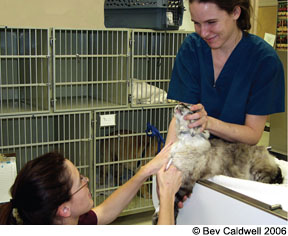Blood can be the gift of life not just for us, but also for our cats. “A cat suffering severe injury or trauma may require blood transfusions,” says Marjory Brooks, DVM, internal medicine specialist and co-director of the coagulation section at Cornell Universitys Animal Health Diagnostic Laboratory.


288
Other indications for transfusion include surgical complications and anemia caused by autoimmune disease, renal failure, chemotherapy, parasites in the intestinal tract or fleas. “Young kittens are especially at risk for blood-loss anemia caused by flea infestation,” says Dr. Brooks. Cats that need plasma proteins to combat liver disease, clotting problems or rat poisoning may also require a transfusion.
Qualified Donors
Donor cats are screened before they enter a donor program to ensure that they are free of viral diseases such as feline leukemia and feline immunodeficiency virus, and other blood-borne infectious agents such as Hemobartonella or Bartonella. “Before each donation, cats temperatures are checked, and they are given a physical exam to make sure theyre healthy,” says Dr. Brooks.
Donors should be indoor cats that are maintained on a flea-control product and free of intestinal parasites. “Males tend to have a higher red-cell count and heavier body weight,” says Dr. Brooks, which means that male cats tend to make better donors than females. Donor cats are usually two to 10 years old, with no history of pregnancy or prior transfusion because of possible sensitization to foreign blood cells or proteins.
Youre My Type
Using a donor that is the same breed as a recipient is no guarantee that the blood types will match. “Theres a different proportion of types in different breeds,” says Dr. Brooks. (Approximately half of British shorthair and rex cats are type B while most domestic shorthairs are type A, for example.)
The blood-type trait is inherited in a recessive pattern like the genes governing hair length. The gene responsible for blood type A antigen is dominant to the gene for type B. A type-A cat may carry the recessive B gene, and two type-A parents could therefore produce type-B offspring if both carry the recessive type-B gene. Two type-B parents produce only type-B kittens. And its possible to have different blood types among kittens in a litter.
Giving a recipient the wrong blood type can have dire consequences. “Giving type-A blood to a type-B recipient causes acute transfusion reactions,” says Dr. Brooks. “It could be fatal.”
Another complication of blood type incompatibility is neonatal hemolysis (also called neonatal isoerythrolysis), a condition occurring when a type-B queen is bred to a type-A tom. Type-A kittens in the litter are at risk for anemia because their type A cells are destroyed by antibodies present in the queens first milk. For this reason, type-B queens should only be bred to type-B toms.
The Process
Cats should give blood no more than three to four times a year. “If a cat donates too frequently, she can become anemic or iron deficient,” says Dr. Brooks. Otherwise, giving blood has few risks. “A cat might have an adverse reaction to the drug used for sedation,” says Dr. Brooks, “or she might develop hypotension or a bruise or swelling at the blood collection site.”
Who Are the Donor Cats?


